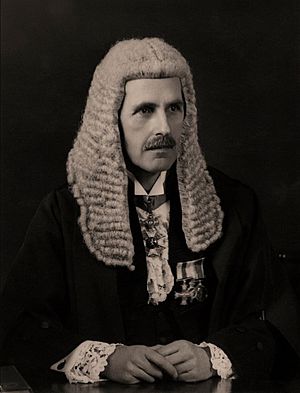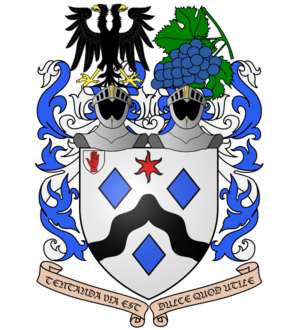Norman Stronge facts for kids
Quick facts for kids
Sir Norman Stronge
|
|
|---|---|

Sir Norman Stronge wearing the Speaker's wig.
|
|
| Speaker of the Northern Ireland House of Commons |
|
| In office 1945–1956 |
|
| In office 1956–1969 |
|
| Member of the Northern Ireland House of Commons |
|
| In office 1938–1969 |
|
| Constituency | Mid Armagh |
| Personal details | |
| Born |
Charles Norman Lockhart Stronge
23 July 1894 Bryansford, County Down, Ireland |
| Died | 21 January 1981 (aged 86) Tynan Abbey, County Armagh, Northern Ireland |
| Cause of death | Gunshot wounds |
| Political party | Ulster Unionist Party |
| Spouses | Gladys Olive Hall (born 23 July 1894; m. 1921–1980; her death); 4 children |
| Children | James Stronge Daphne Marian, Mrs Kingan Evelyn Elizabeth Stronge Rosemary Diana Stronge |
Sir Charles Norman Lockhart Stronge (born July 23, 1894 – died January 21, 1981) was an important politician in Northern Ireland. He was known as the 8th Baronet, which is a special title passed down through families. He also received the Military Cross for his bravery.
Before becoming a politician, Sir Norman served as an officer in the British Army during the First World War. He fought in the famous Battle of the Somme in 1916. After the war, he became the Speaker of the House of Commons of Northern Ireland for 23 years. This meant he was like the referee for political debates.
Sadly, Sir Norman and his son, James, were killed in 1981 by the Provisional Irish Republican Army (IRA) at their home, Tynan Abbey. Their home was also burned down during the attack.
Contents
Sir Norman's Early Life and Military Service
Sir Norman Stronge was born in Bryansford, a town in County Down, Ireland. His father was Sir Charles Stronge, the 7th Baronet. His mother, Marian Bostock, came from Epsom.
He went to a famous school called Eton College. When the First World War started in 1914, he joined the British Army. He became a second lieutenant in the Royal Inniskilling Fusiliers.
Fighting in the First World War
Sir Norman fought on the Western Front in France and Belgium. He was a lieutenant and later a captain. He showed great courage and was given the Military Cross. He also received the Belgian Croix de guerre.
He survived the very first day of the Battle of the Somme in July 1916. He was one of the first soldiers mentioned for bravery by General Sir Douglas Haig. Sir Douglas Haig was the commander of the British forces on the Western Front.
In April 1918, Sir Norman became an adjutant for another army unit. He was injured in Belgium in October 1918, near the end of the war. He left the army in 1919 but was allowed to keep his rank of captain.
Service in the Second World War
When the Second World War began in 1939, Sir Norman joined the army again. He became a second lieutenant in the North Irish Horse. However, he had to leave the army in 1940 due to poor health.
In 1950, he was given the honorary title of Honorary Colonel. This was for a special army reserve unit called the Royal Irish Fusiliers.
Sir Norman's Political Journey
Sir Norman Stronge began his political career in 1934. He was appointed High Sheriff of County Londonderry. This was an important local role.
In 1938, he was elected as a Member of Parliament (MP). He represented Mid Armagh for the Ulster Unionist Party. He held this seat in the House of Commons of Northern Ireland until he retired in 1969.
Working in Government
Sir Norman quickly moved up in the government. In 1941, he became an Assistant Whip for the Ministry of Finance. A whip helps make sure party members vote together.
In 1942, he was promoted to Chief Whip. He held this important job when J. M. Andrews was replaced as Prime Minister of Northern Ireland. Sir Norman stepped down from his government role in 1944.
Becoming the Speaker of the House
In 1945, Sir Norman was chosen to be the Speaker of the Northern Ireland House of Commons. This meant he was in charge of debates in Parliament. He had to be fair and polite to everyone.
Lord Glentoran nominated him, saying Sir Norman's family was known for fairness. An Irish nationalist MP, Jack Beattie, also supported his nomination.
In 1945, Sir Norman had to deal with a disagreement in the chamber. A minister was sick and couldn't answer questions. Sir Norman allowed the questions to be delayed. This led to an argument between two other MPs, Harry Midgley and Jack Beattie. Midgley even punched Beattie! Sir Norman quickly restored order and made Midgley leave. Midgley apologized the next day.
Other Important Roles
Sir Norman was appointed to the Privy Council of Northern Ireland in 1946. This is a group of important advisors. He was also the Chairman of Armagh County Council from 1944 to 1955.
He held many other important positions. He was the Lord Lieutenant of Armagh from 1939 to 1981. This role represents the King or Queen in the county. He was also President of the Northern Ireland Council of the Royal British Legion. This group helps former soldiers.
Sir Norman was also a Justice of the Peace for both Armagh and Londonderry. He was involved in the Royal Black Institution and the Orange Order, which are cultural organizations. In 1952, he was made a Commander Brother of the Venerable Order of Saint John. He was promoted to Knight in 1964.
In 1956, Sir Norman had to temporarily step down as Speaker. He held a position on a council that theoretically could pay money. This was seen as an "Office of Profit under the Crown," which meant he couldn't also be Speaker. New laws had to be passed to fix this. He was re-elected as Speaker a few months later.
Sir Norman's Family Life
Sir Norman Stronge married Gladys Olive Hall on September 15, 1921. She was from Athenry, County Galway. They had four children together:
- James Stronge, who was killed with his father.
- Daphne Marian Stronge (1922–2002). She married Thomas John Anthony Kingan. Her son, James, now lives at the family's home in Tynan.
- Evelyn Elizabeth "Evie" Stronge (born 1925). She married Charles Harold Arthur Olivier.
- Rosemary Diana Stronge (1928–1929), who sadly died when she was only one year old.
After retiring from politics in 1969, Sir Norman spent his time farming. He managed the family's large estate at Tynan Abbey.
Sir Norman's Death
Sir Norman Stronge, who was 86 years old, and his son, James, who was 48, were killed on January 21, 1981. They were watching television in their home, Tynan Abbey. Members of the Provisional Irish Republican Army (IRA) attacked their home. They used grenades to break down the doors.
The Stronge family home was then set on fire by two bomb explosions. Police and British Army troops arrived after seeing the explosions. They found at least eight gunmen trying to escape. A gunfight happened, but the gunmen got away. Sir Norman and James were found in the burning library. They had both been shot.
Sir Norman was buried in Tynan Parish church. His funeral was held with his son's. The sword and cap of another important person were placed on his coffin. This was because his own belongings were destroyed in the fire.
Soldiers from the 5th Battalion the Royal Irish Rangers carried his coffin. This regiment was connected to his old army unit. During the service, a message from Queen Elizabeth II was read. She expressed her deep sadness about the tragic loss.
The village of Tynan was full of people for the funeral. Mourners came from all over, including politicians and church leaders. The service was broadcast outside the church because so many people attended. After the service, the coffins were laid in the family burial plot. Lady Stronge, Sir Norman's wife and James's mother, had been buried there a year before.
The Secretary of State for Northern Ireland, Humphrey Atkins, was told not to attend the funeral. This was because of government policy on border security.
Sir Norman Stronge is remembered with a special tablet. It is in the Northern Ireland Assembly Chamber at Parliament Buildings.
Reactions to the Killings
The IRA said the attack was a response to other killings. These were killings of nationalist people by loyalist groups.
Many newspapers and important people called the killings "murder." This included The Daily Telegraph and The New York Times. Reverend Ian Paisley and Lord Cooke of Islandreagh also called it murder.
A politician named Austin Currie described Sir Norman as a strong man. He said Sir Norman was "incomparably more of a man than the cowardly dregs of humanity who ended his life in this barbaric way."
Later Events Related to the Killings
In 1984, a man named Seamus Shannon was arrested. He was accused of being involved in the murders of Sir Norman and James Stronge. The Irish Supreme Court said the murders were "so brutal, cowardly and callous" that they could not be considered political acts. Shannon was sent to Northern Ireland for trial but was later found not guilty.
In 2015, Mitchel McLaughlin became the Speaker of the Northern Ireland Assembly. He was the first Speaker from Sinn Féin. The leader of Sinn Féin, Gerry Adams, had once made a controversial comment about the Stronge murders. He said that some nationalists only wished Sir Norman had been shot earlier.
During the debate about McLaughlin's election, politician Jim Allister criticized other politicians. He said they should feel ashamed when they pass the memorial to Sir Norman Stronge.
 | Aaron Henry |
 | T. R. M. Howard |
 | Jesse Jackson |


